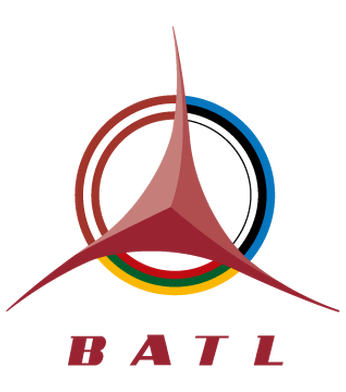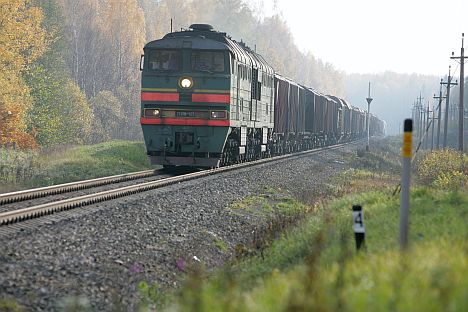Latvia’s Competition Council (KP) has fined SIA LDz Cargo EUR 5 694 174 for violations of competition. Latvijas dzelzceļš (LDz) as the holder of 100% of shared in SIA LDz Cargo is expected to take responsibility for the payment of the fine, as KP reports.
KP found that since 2007 SIA LDz Cargo has been abusing its dominant position on the market, making competitors’ operations on Latvia’s railway freight market more difficult by using varied pricing practice for its own and competitors’ freight transports and even terminating transport contracts close to the Russian and Belarusian borders, as well as unjustifiably setting a fee for downtime of privately owned freight wagons on public railroads.
In 2007, to prevent a situation when the railway infrastructure manager also provides cargo transport services, which is something that can be done by private businessmen, the previously commenced reorganization of LDz had been finished. As a result of this reorganization, its subsidiary LDz Cargo took over cargo service operations. Currently there are four companies that provide railway freight services in Latvia. However, between 2007 and 2020 SIA LDz Cargo has held 70-80% of the total railway freight market in the country.
At the press-conference held on Wednesday, 3 February, KP chairman Juris Gaiķis admitted that complaints regarding unfair practices were received a long time ago.
It should be noted that in regards to the final decision LDz claimed KP did not act in accordance with the principle «consult first», but this is not true. Gaiķis said in 2012 KP had already commenced a case that did not result in a penalty, rather recommendations for LDz to refrain from abuse of power in regards to fees. Transport Ministry even warned LDz council of market distortion.
Consultations with LDz and LDz Cargo had been performed in regards to previously received complaints. They were held with both Latvia’s Transport Ministry and European Commission. However, what was mentioned by KP in those consultations was not taken into account. This is why the case was commenced in 2018 and a respective decision was made in the end, explains Gaiķis.
When asked how the case evaluates the responsibility of specific people, Gaiķis noted that it is not a question for KP to answer as to how losses will be compensated in any company or its subsidiary. «LDz Cargo is a profitable company with a considerable turnover, from which the fine was calculated. This is why the fine has been applied for LDz Cargo. The payment of the fine is the responsibility of LDz Cargo and its parent company.»
Different pricing practices for own and competitors’ clients
To ensure international railway freights to and from Russia and Belarus, it is necessary to pass through the border railway stations in Kārsava, Zilupe or Indra. However, stations that are used to process international freights are located 50-90 km away – in Rezekne and Daugavpils.
Historically freight arrival and departure services from border stations all the way to the stations in Rezekne and Daugavpils have been performed by Latvian Railway. After the company’s reorganization, however, this service was delegated to SIA LDz Cargo.
As a result, the clients who wish to send or receive cargo through Latvia, have to work with SIA LDz Cargo, which is not subjected to competition pressure and is able to freely set fee amounts.
Considering all that, SIA LDz Cargo provides its clients, who use the company’s services along the entirety of its route, not just along the border, with different benefits – such as discounts and other preferential bonuses, KP explains. Clients who entrust their freights in Latvia to one of the three private service providers, SIA LDz Cargo applies with standard tariffs for services along the border, the council notes.
«Additionally, in situations when clients want to switch from LDz Cargo to any of its competitors, SIA LDz Cargo terminates the previously beneficial contract and also applies them with standard tariffs, which increases costs along the entire route.» KP believes as a result of such operations clients it becomes uneconomical for clients to pick SIA LDz Cargo competitors, which obstructs the entry of new service providers to the market and distorts competition among existing companies, as well as influences consumers’ freedom of choice.
Unjustified fee for downtime of privately owned freight wagons
Both inventory wagons and privately owned wagons are used in Latvia for freight transports. Historically freight transports in Latvia have been provided using USSR-owned wagons, which were taken over by former USSR countries or privatized after the restoration of independence. The wagons that became state property were named inventory wagons. They remain tied to the unified wagon park and their usage is coordinated by the Commonwealth Rail Transport Council, in which Latvia is a member. Since 2007 inventory wagon (container) and privately owned wagon (container) accounting in Latvia is performed by SIA LDz Cargo. Additionally, LDz Cargo also performs transactions for usage of inventory wagons (containers) with railway administrations of other countries, the council explains.
KP also notes that in accordance with Carriage by Rail Law, carriers may charge cargo recipients or senders for wagon downtime. This condition was introduced in order to improve turnover of wagons. At the same time, SIA LDz Cargo is the only freight carrier in Latvia that accounts wagon downtime and calculated the fee for it. On top of that, SIA LDz Cargo determined downtime fees not only in cases when railway freights involve inventory wagons, the use of which is Latvia’s responsibility, but also in cases when railway freights involve privately owned wagons, the use of which is agreed upon by the freight sender or recipient or their representatives, notes KP.
KP found that SIA LDz Cargo’s downtime fees for usage of inventory wagons are justified as far as necessary to cover maintenance costs.
First of all, one of SIA LDz Cargo’s provided justifications for this fee is ensuring efficient processing capacity for public railway infrastructure. However, Latvian Railway is the railway infrastructure manager in Latvia. At the same time, this function is not delegated to SIA LDz Cargo.
Secondly, as noted by KP, agreements in regards to the use of privately owned wagons are reached between recipients or senders of the cargo and the owner or representative of wagons. According to KP, in a situation when freight carrying services are performed by one of three private businesses there is no causality between SIA LDz Cargo’s costs and downtime fees set for use of privately owned wagons. SIA LDz Cargo has not provided any information or justifiable reasons as to why the downtime fee for privately owned wagons is collected on behalf the owner, KP stresses.
Public person’s operations have to comply with fair competition principles
Several complaints have been submitted to the European Commission in relation to restricted options for private businessmen to perform cross-border freight carrying in Latvia. The European Commission invited clarifying existing national regulations so that they meet fair competition principles. On 28 August 2020 Cabinet of Ministers req. Nr. 540 On Use of Public Railway Infrastructure Carriers’ Provided Services in Border Regions came to force. These rules, among other things, state that instead of SIA LDz Cargo Latvian Railway is to become the cooperation partner along border routes.
KP stresses that regardless of whether or not freight carrying services along the border are provided by SIA LDz Cargo or its parent company Latvian Railway, the public person’s actual operation have to comply with fair competition principles and their operations must not impede the entry of other service providers to the market or reduce clients’ freedom of choice.
This is dictated by the competition neutrality principle, which prohibits the state and municipalities from distorting the market by using advantages unavailable to private service providers.
The head of KP also reported that at the beginning of 2020 KP had multiple meetings regarding this case and other related topics. «We have provided multiple consultations to both Transport Ministry and LDz. However, it is difficult to comment how implementation of those recommendations has gone from the ministry’s side.»





